Karina Marusińska is an interdisciplinary artist whose activities combine visual arts and ceramics. Here she talks to Contemporary Lynx about her project “Good Visibility”, which she prepared while participating in a residence programme in Birmingham.
Invited by Centrala Art Gallery, in collaboration with Creative Black Country and Art Transparent foundation, Karina prepared a series of workshops for the inhabitants of West Bromwich, one of the most deprived districts of Birmingham, the population of which consists mostly of immigrants – with Poles making up the largest group. For three weeks Karina held workshops every day, where those who came could try their hand at glass painting. The theme for these painting sessions was dreams, which became an incentive for having conversations about long forgotten aspirations and mundane lives in foreign countries. This time spent together was a great opportunity to make new friends and have honest and meaningful conversations with them. The meetings also allowed its participants to overcome daily routines.
We met Karina on one July afternoon while she prepared one of the workshop sessions in the Central Library. We discovered an outgoing person full of energy, whose projects are born out of true passion. As she says, when she works on a project, she is totally absorbed in it. Her day job is working for the Academy of Fine Arts in Wrocław. She is an interdisciplinary artist, an educator, as well as a social and cultural animator.
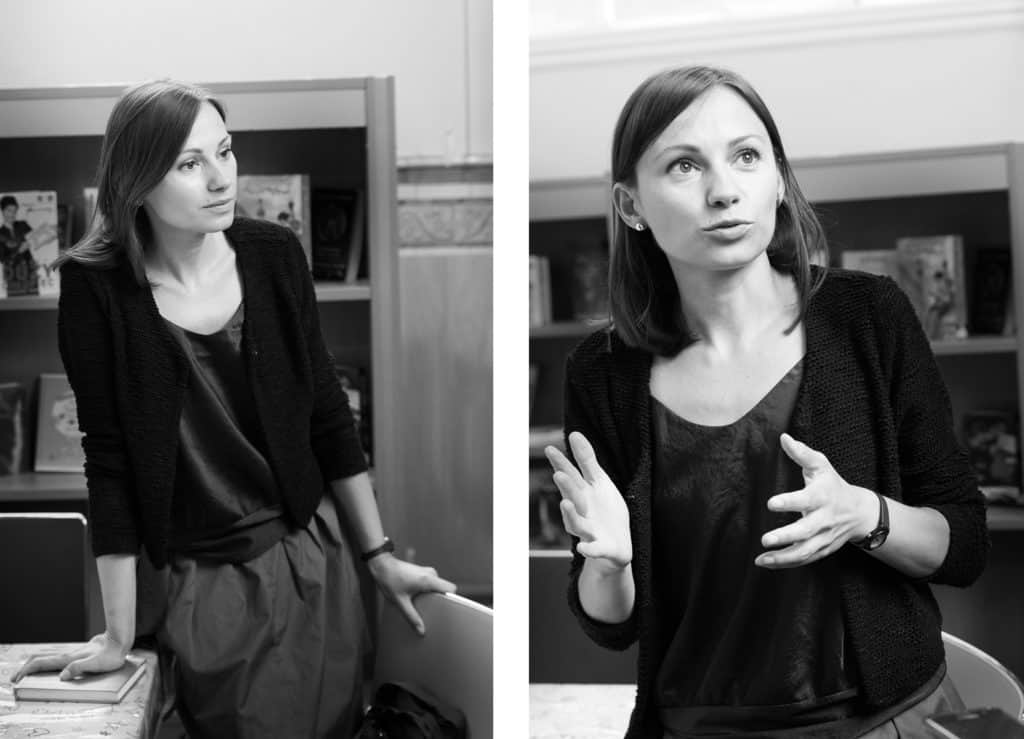
Karina Marusińska, image Sławek Kozdraś
Sylwia Krasoń: “Good Visibility” is a project which finds itself situated in between socially engaged art and sociology. Since the very beginning it was intended for people who are normally excluded from society. How did you prepare for this particular project?
Karina Marusińska: I first came to Birmingham in March to do my own little bit of research. I walked through the city a lot, always without a map, and asked passers-by for directions and other ordinary things. Exploring a new space in this way allows me to create a mental picture of what I will have to deal with later. On subsequent occasions I am more careful than normal and I take a massive amount of notes. My previous experience has shown me that the ideas which come to me at this stage, i.e. at the beginning of my explorations, are usually the best ones. Intuition is what drives me, and I am not let down too often. During my first stay in Birmingham I learnt about the problems that the local community struggles with, and what the organizers expected from me. Generally speaking, my role was to galvanise immigrants and encourage them to take an active part in the social and cultural life of the city. We could say that my task was to pave the way for the further development of events. As I walked through the city, I encountered certain visual clues, which served as central motifs for my project. I would like to especially mention the numerous stained-glass windows that I saw which are vital elements of the city’s cultural heritage. There are also other kinds of windows, divided into plots. In general, windows acquired a special, broader meaning here. They serve as the border between two worlds – our privacy and the public space. Many of the problems which I only discovered upon moving to Birmingham had their roots in this very borderline. The next stage of my preparations for the project was about collecting all this information and making it into a coherent whole. I then had to adjust the level of my workshops to reflect the actual abilities of future participants. I am aware that for many projects of this kind the intended outcomes do not correlate with the actual needs. Therefore, I have stayed open-minded and willing to change what I have planned in order to adjust to the natural course of events. As it turned out, my idea was a success.
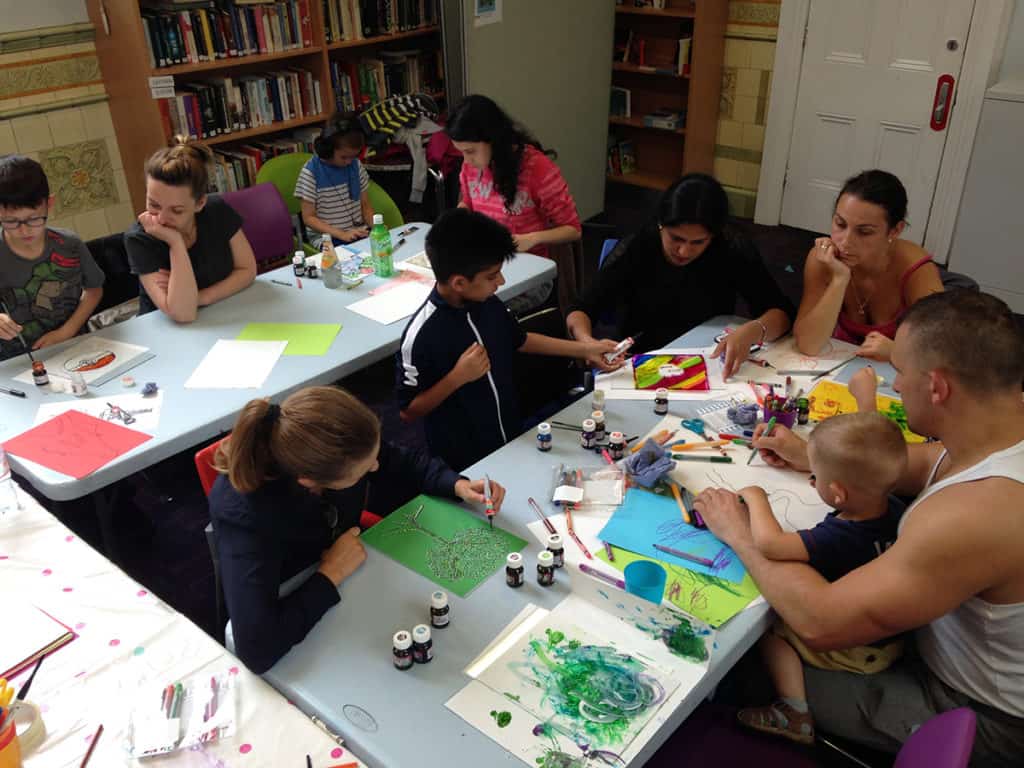
photo Karina Marusińska, Birmingham 2017
SK: What about your first encounter with the West Bromwich community? What was the most shocking thing for you in this neighbourhood?
K.M.: Being an outsider has its advantages and disadvantages. One obvious advantage is that if you are a “stranger” or a “guest” you see things which regular inhabitants fail to notice. The insiders tend to blend in with the mundane surroundings and simply come to terms with the situation they happen to live in. I have a lot of energy and I strongly believe that there is always a way to change things for the better. In contrast, the inhabitants of West Bromwich do not have such hope anymore or do not see the need to make any changes at all. There is, however, an important disadvantage of being an outsider. As a visitor, you are tempted to develop an attitude of showing that you “know better” than the people actually living in that environment. I tried not to think that way myself. This is why I assumed the role of a listener who was interested to hear what the locals had to say. Art and creative activities in general can give an opportunity to speak to people who are normally silent.
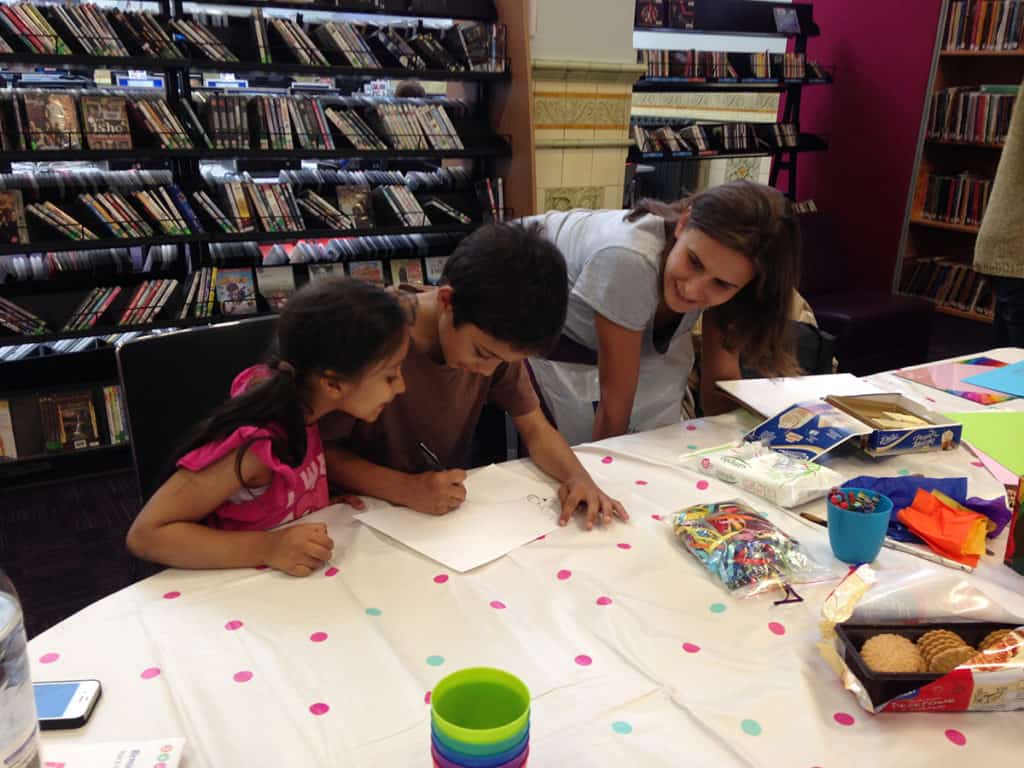
photo Karina Marusińska, Birmingham 2017
SK: Only between 2004 and 2009, more than 600 000 Poles have come to the UK (source: ONS). The majority decided to make this move to find a better-paid job. As you have noticed, their stories are often quite sad with loneliness and social exclusion being commonplace. What were the most frequent questions that the participants asked you? What was the typical gist of your conversations?
K.M.: Usually, it was they who did the talking. People truly needed to share their worries, grief, longing and feelings of lack of control over the course of events with someone. This really showed me how lonely they felt and how they struggled to find their place in this melting pot of diverse cultures. Aterrifying fact for me was that these people were aware of their rights (e.g. as employees) being violated but agreed to such violation at the same time. I was shocked when I realized that they did not believe there was any way to change this situation for the better. At the same time, they realized that there was no justice, people were not treated equally and there were many internal conflicts. They talked about all these aspects during our conversations. Glass painting was supposed to help them imagine a better world, one where they would feel happy and respected by others. Making people feel such need is the first step to action on a larger scale. Someone said that we can change reality by changing our perception of it. I strongly believe that.
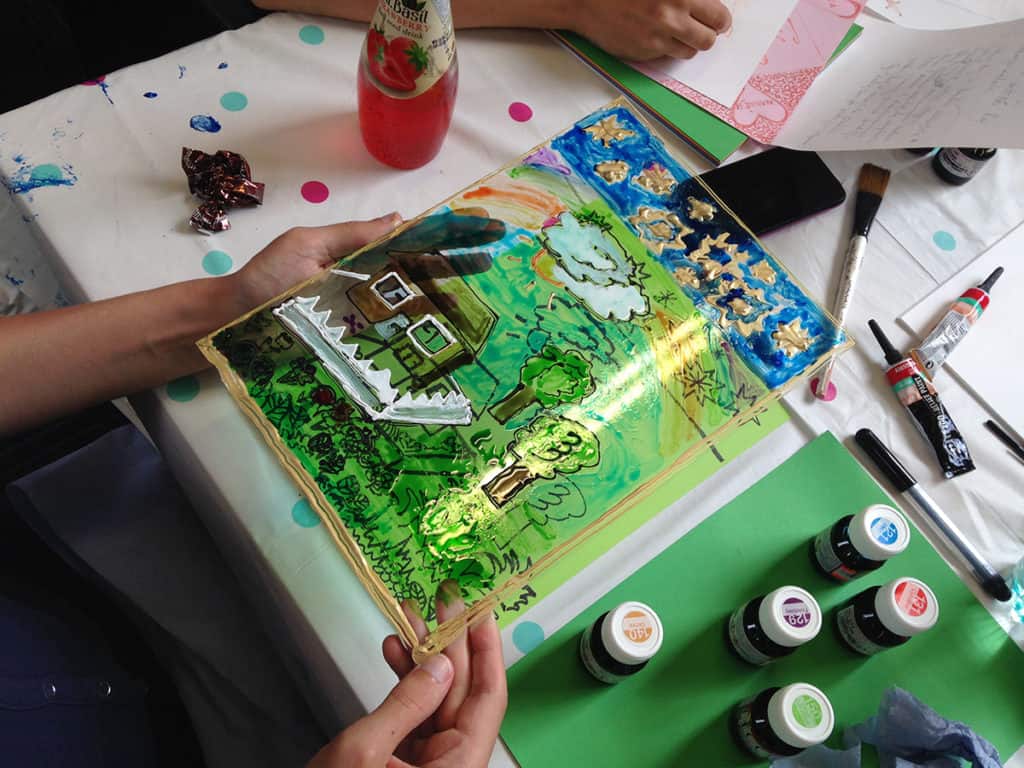
photo Karina Marusińska, Birmingham 2017
SK: Was it difficult for you to convince the locals to participate in your project?
K.M.: Certainly it was not easy. The locals are not used to the idea of other people wishing to do something positive especially for them, and invest private time and energy. Neither are they used to taking their time to do things for themselves and taking a break from their hectic lives. The first step was very difficult for them but when they finally sat at the table and started painting they totally got into it. They said that they felt like children again. Some of them even returned to my workshops several times and brought their families and friends along. Little by little does the trick. There were more and more people who wanted to participate in painting workshops as time passed. This is why I think it would be wonderful if the project could be continued in the future. People made new friends at the painting table. They had an opportunity to share their experiences and broaden their knowledge. My workshops attracted people who would normally never spend time together for various reasons, like deep seated prejudices. During the workshops, they got to know one another better, became more open-minded, and battled stereotypes. It was really interesting for me to see all these.

photo Karina Marusińska, Birmingham 2017
SK: Overall, what was the most difficult aspect of this project?
K.M.: It was difficult for me to strictly follow the rules I had defined myself. I mean, it was hard to offer people a space and the opportunity to open themselves up and to maintain a safe distance at the same time. I struggled not to become too engaged in every difficult story I heard from my participants. I tend to immediately look for solutions to problems and to be active rather than passive, but I am also aware that people should act on their own and it is not good when someone else does everything for them. If you want to help, the best idea is to show them the ways in which they can improve their existing situation or give them a hint as to which professionals can assist them. The rest is what the people interested should do themselves. I try to always adhere to this principle. I can only hope that I managed to maintain the proper balance and that none of the participants of my workshops felt neglected in any way.
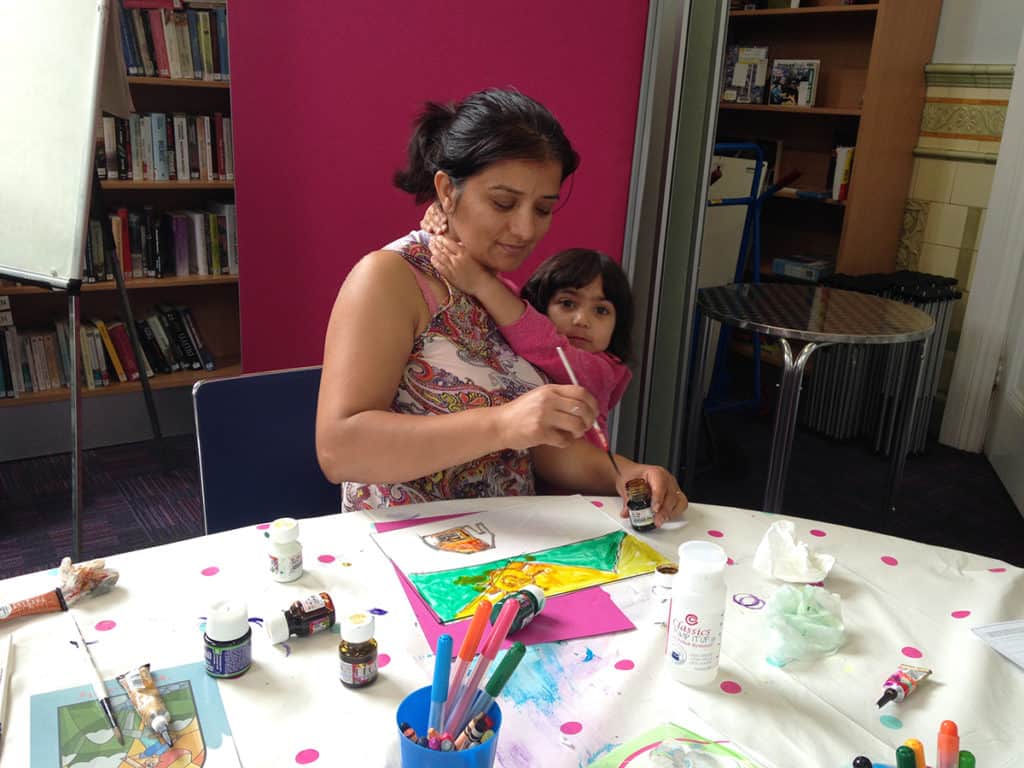
photo Karina Marusińska, Birmingham 2017
SK: The results of the project will be presented at an exhibition at Centrala Art Gallery to be held in September. We will be able to see all glass paintings made by the workshops’ participants there. The glass paintings will then be combined into one big installation – a window. Tell me more about this event.
K.M.: Indeed, the exhibition will serve as a grand finale of sorts for the workshops. It will be the participants speaking through their works. Presenting these works to a larger audience will allow everybody to see the world through the perspective of the dreams and ambitions of their authors. I have not seen all the works presented together yet but I am very interested as to the extent that certain dreams are shared by people from various parts of the world. As far as I remember, some common motifs in the picture were a house, rainbow, sun and nature. Apart from the installation, the visitors to the exhibition will be able to see the photos taken during the workshops.
In the middle of November, the exhibition will be presented in Wrocław. The pictures painted on glass will be displayed in the windows of the Geppert’s Residence Contemporary Art Gallery run by Art Transparent foundation, which is a partner of my project. I am very happy and cannot wait for the exhibition, especially because a few of the workshop’s participants proudly announced that they will invite their families from Poland to the opening night.
I am also preparing an art intervention entitled “Viewpoint”, which will take place during the exhibition “What the eye doesn’t know” in the space just next to Centrala Gallery. The intervention will be about manipulating a picture, a frame showing the surroundings will refer to the phenomenon of fake news – one of the most serious dangers to contemporary societies. Visitors will be able to move between the real and fake world.
Although both constituent parts of the exhibition are different in terms of stylistics, both involve the motif of a filter through which we look at the surrounding reality. One of these filters is within arm’s reach and assists our personal development, and helps us become aware of our needs, visualize a better world and come closer to it. The second one, fabricated away from us, exists to relax our vigilance. Both projects use the strategies of manipulating pictures, but the motivation behind them is completely different. I wanted to emphasize that we can influence the surrounding reality, by trying to visualize and realize our dreams, for instance, but mostly by active participation and reflection. We should not merely be passive recipients. I encourage people to get to know more, sharpen their senses and think critically. It should apply both to our encounters with works of art, but also to our everyday lives.

Karina Marusińska, Good visibility
Centrala Art Gallery, Birmingham
Karina Marusińska ‘What the eye doesn’t know’
curated by Małgorzata Sobolewska, in collaboration with Art Transparent Foundation
Opening: 22 September
22 September – 4 November 2017
Galeria Mieszkanie Gepperta, Wrocław
Karina Marusińska ‘Good visibility’
24 November – 8 December 2017











